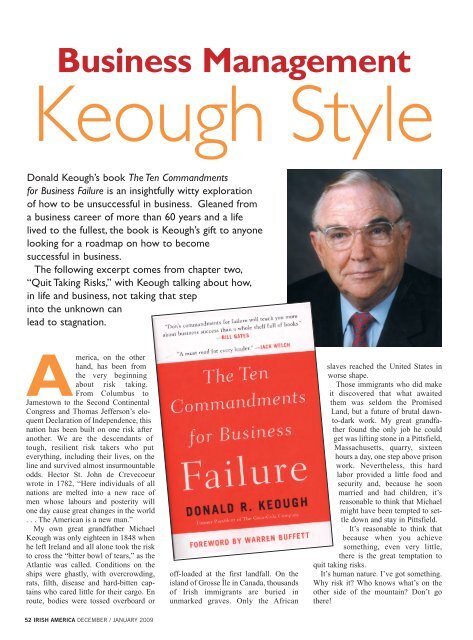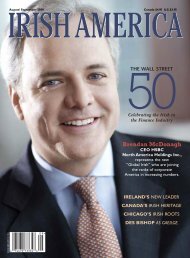Create successful ePaper yourself
Turn your PDF publications into a flip-book with our unique Google optimized e-Paper software.
Business Management<br />
Keough Style<br />
Donald Keough’s book The Ten Commandments<br />
for Business Failure is an insightfully witty exploration<br />
of how to be unsuccessful in business. Gleaned from<br />
a business career of more than 60 years and a life<br />
lived to the fullest, the book is Keough’s gift to anyone<br />
looking for a roadmap on how to become<br />
successful in business.<br />
The following excerpt comes from chapter two,<br />
“Quit Taking Risks,” with Keough talking about how,<br />
in life and business, not taking that step<br />
into the unknown can<br />
lead to stagnation.<br />
America, on the other<br />
hand, has been from<br />
the very beginning<br />
about risk taking.<br />
From Columbus to<br />
Jamestown to the Second Continental<br />
Congress and Thomas Jefferson’s eloquent<br />
Declaration of Independence, this<br />
nation has been built on one risk after<br />
another. We are the descendants of<br />
tough, resilient risk takers who put<br />
everything, including their lives, on the<br />
line and survived almost insurmountable<br />
odds. Hector St. John de Crevecoeur<br />
wrote in 1782, “Here individuals of all<br />
nations are melted into a new race of<br />
men whose labours and posterity will<br />
one day cause great changes in the world<br />
. . . The American is a new man.”<br />
My own great grandfather Michael<br />
Keough was only eighteen in 1848 when<br />
he left Ireland and all alone took the risk<br />
to cross the “bitter bowl of tears,” as the<br />
Atlantic was called. Conditions on the<br />
ships were ghastly, with overcrowding,<br />
rats, filth, disease and hard-bitten captains<br />
who cared little for their cargo. En<br />
route, bodies were tossed overboard or<br />
off-loaded at the first landfall. On the<br />
island of Grosse Île in Canada, thousands<br />
of Irish immigrants are buried in<br />
unmarked graves. Only the African<br />
slaves reached the United States in<br />
worse shape.<br />
Those immigrants who did make<br />
it discovered that what awaited<br />
them was seldom the Promised<br />
Land, but a future of brutal dawnto-dark<br />
work. My great grandfather<br />
found the only job he could<br />
get was lifting stone in a Pittsfield,<br />
Massachusetts, quarry, sixteen<br />
hours a day, one step above prison<br />
work. Nevertheless, this hard<br />
labor provided a little food and<br />
security and, because he soon<br />
married and had children, it’s<br />
reasonable to think that Michael<br />
might have been tempted to settle<br />
down and stay in Pittsfield.<br />
It’s reasonable to think that<br />
because when you achieve<br />
something, even very little,<br />
there is the great temptation to<br />
quit taking risks.<br />
It’s human nature. I’ve got something.<br />
Why risk it? Who knows what’s on the<br />
other side of the mountain? Don’t go<br />
there!<br />
52 <strong>IRISH</strong> <strong>AMERICA</strong> DECEMBER / JANUARY 2009









